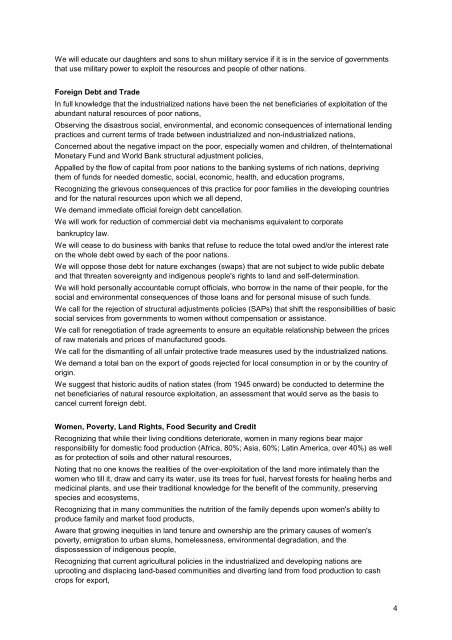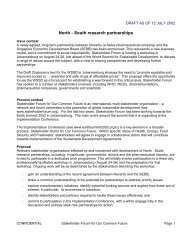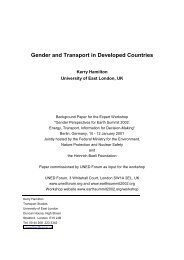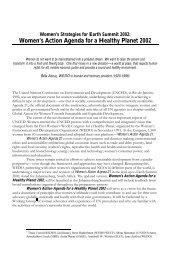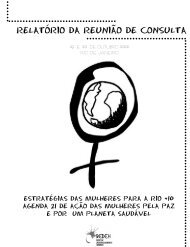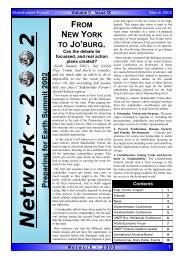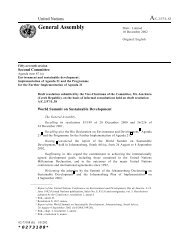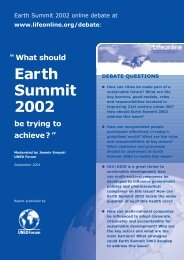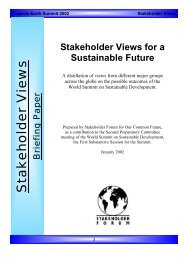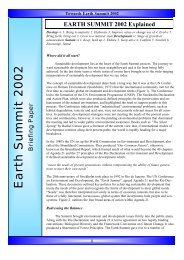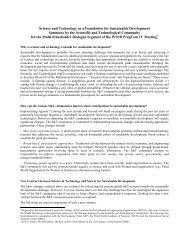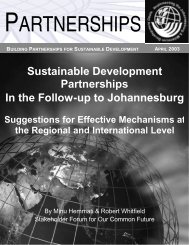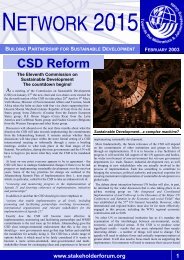Women's Action Agenda 1991 - Earth Summit 2002
Women's Action Agenda 1991 - Earth Summit 2002
Women's Action Agenda 1991 - Earth Summit 2002
Create successful ePaper yourself
Turn your PDF publications into a flip-book with our unique Google optimized e-Paper software.
We will educate our daughters and sons to shun military service if it is in the service of governments<br />
that use military power to exploit the resources and people of other nations.<br />
Foreign Debt and Trade<br />
In full knowledge that the industrialized nations have been the net beneficiaries of exploitation of the<br />
abundant natural resources of poor nations,<br />
Observing the disastrous social, environmental, and economic consequences of international lending<br />
practices and current terms of trade between industrialized and non-industrialized nations,<br />
Concerned about the negative impact on the poor, especially women and children, of theInternational<br />
Monetary Fund and World Bank structural adjustment policies,<br />
Appalled by the flow of capital from poor nations to the banking systems of rich nations, depriving<br />
them of funds for needed domestic, social, economic, health, and education programs,<br />
Recognizing the grievous consequences of this practice for poor families in the developing countries<br />
and for the natural resources upon which we all depend,<br />
We demand immediate official foreign debt cancellation.<br />
We will work for reduction of commercial debt via mechanisms equivalent to corporate<br />
bankruptcy law.<br />
We will cease to do business with banks that refuse to reduce the total owed and/or the interest rate<br />
on the whole debt owed by each of the poor nations.<br />
We will oppose those debt for nature exchanges (swaps) that are not subject to wide public debate<br />
and that threaten sovereignty and indigenous people's rights to land and self-determination.<br />
We will hold personally accountable corrupt officials, who borrow in the name of their people, for the<br />
social and environmental consequences of those loans and for personal misuse of such funds.<br />
We call for the rejection of structural adjustments policies (SAPs) that shift the responsibilities of basic<br />
social services from governments to women without compensation or assistance.<br />
We call for renegotiation of trade agreements to ensure an equitable relationship between the prices<br />
of raw materials and prices of manufactured goods.<br />
We call for the dismantling of all unfair protective trade measures used by the industrialized nations.<br />
We demand a total ban on the export of goods rejected for local consumption in or by the country of<br />
origin.<br />
We suggest that historic audits of nation states (from 1945 onward) be conducted to determine the<br />
net beneficiaries of natural resource exploitation, an assessment that would serve as the basis to<br />
cancel current foreign debt.<br />
Women, Poverty, Land Rights, Food Security and Credit<br />
Recognizing that while their living conditions deteriorate, women in many regions bear major<br />
responsibility for domestic food production (Africa, 80%; Asia, 60%; Latin America, over 40%) as well<br />
as for protection of soils and other natural resources,<br />
Noting that no one knows the realities of the over-exploitation of the land more intimately than the<br />
women who till it, draw and carry its water, use its trees for fuel, harvest forests for healing herbs and<br />
medicinal plants, and use their traditional knowledge for the benefit of the community, preserving<br />
species and ecosystems,<br />
Recognizing that in many communities the nutrition of the family depends upon women's ability to<br />
produce family and market food products,<br />
Aware that growing inequities in land tenure and ownership are the primary causes of women's<br />
poverty, emigration to urban slums, homelessness, environmental degradation, and the<br />
dispossession of indigenous people,<br />
Recognizing that current agricultural policies in the industrialized and developing nations are<br />
uprooting and displacing land-based communities and diverting land from food production to cash<br />
crops for export,<br />
4


